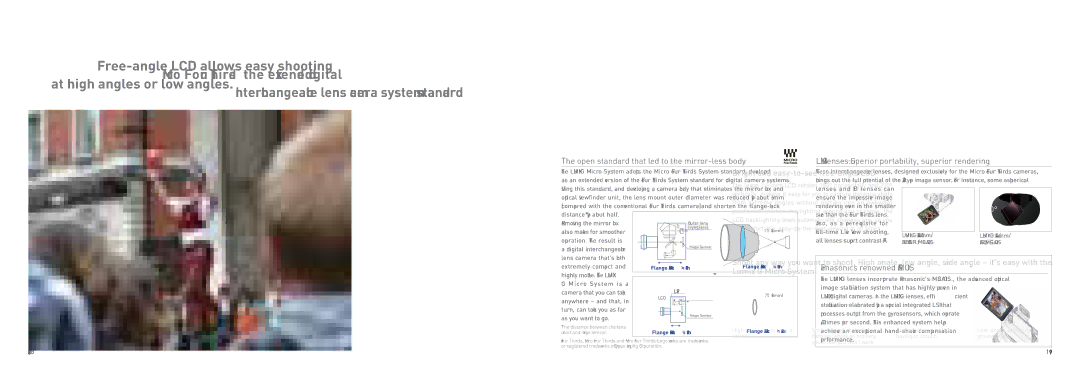
Micro Four Thirds – the extended digital Interchangeable lens camera system standard
The open standard that led to the mirror-less body
The LUMIX G Micro System adopts the Micro Four Thirds System standard, developed as an extended version of the Four Thirds System standard for digital camera systems. Using this standard, and developing a camera body that eliminates the mirror box and optical viewfinder unit, the lens mount outer diameter was reduced by about 6 mm
(compared with the conventional Four Thirds camera) and shorten the | |||
distance* by about half. Four Thirds System |
| Image Sensor | |
Removing the mirror box |
| Ocular lens | |
|
| ||
also makes for smoother |
| (eyeglass) | 75°(28mm) |
|
| ||
operation. The result is |
|
|
|
a digital interchangeable |
| Image Sensor |
|
|
|
| |
lens camera that's both |
|
|
|
extremely compact and | Flange Back = 40mm | Flange Back = 40mm | |
highly mobile. The LUMIX | Micro Four Thirds System |
| |
G Micro System is a | Image Sensor | ||
camera that you can take | LVF | Ocular lens | 75°(28mm) |
anywhere – and that, in | LCD | (eyeglass) | |
|
|
| |
turn, can take you as far |
| Image Sensor |
|
as you want to go. |
|
| |
|
|
| |
*The distance between the lens | Flange Back = 20mm | Flange Back = 20mm | |
mount and image sensor. | |||
•Four Thirds, Micro Four Thirds and Micro Four Thirds Logo marks are trademarks or registered trademarks of Olympus Imaging Corporation.
LUMIX G lenses: Superior portability, superior rendering
These interchangeable lenses, designed exclusively for the Micro Four Thirds cameras,
brings out the full potential of the | ||
lenses and ED lenses can |
|
|
ensure the impressive image |
|
|
rendering even in the smaller |
|
|
size than the Four Thirds lens. |
|
|
Also, as a prerequisite for |
|
|
LUMIX G VARIO | LUMIX G VARIO | |
all lenses support contrast AF. | ||
Panasonic's renowned MEGA O.I.S.
The LUMIX G lenses incorporate Panasonic's MEGA O.I.S., the advanced optical image stabilization system that has highly proven in
LUMIX digital cameras. In the LUMIX G lenses, efficient stabilization elaborated by a special integrated LSI that processes output from the gyrosensors, which operate 4,000 times per second. This enhanced system helps achieve an exceptional
18 | 19 |
